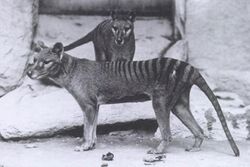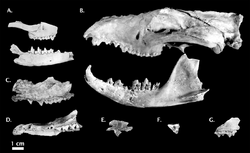Biology:Thylacinidae
| Thylacinidae | |
|---|---|

| |
| Thylacine | |

| |
| Non-Thylacinus thylacinids, including Nimbacinus (top right) | |
| Scientific classification | |
| Domain: | Eukaryota |
| Kingdom: | Animalia |
| Phylum: | Chordata |
| Class: | Mammalia |
| Infraclass: | Marsupialia |
| Order: | Dasyuromorphia |
| Family: | †Thylacinidae C.L. Bonaparte, 1838 |
| Genera | |
|
All extinct, see text | |
Thylacinidae is an extinct family of carnivorous marsupials from the order Dasyuromorphia. The only species to survive into modern times was the thylacine (Thylacinus cynocephalus), which became extinct in 1936.
The consensus of authors prior to 1982 was that the thylacinid family were related to the Borhyaenidae, a group of South American predators, also extinct, that exhibited many similar characteristics of dentition. A review published in 1982 compared the skeletal structure of these groups, concluding the tarsal bones show greater affinity with the dasyurmorphs, strongly supporting the later theory that any dental similarities emerged independently via convergent evolution.[1] Thylacinidae is currently considered to be the most basal and earliest diverging member of Dasyuromorpha, estimated to have split from other dasyuromorphs around 42-36 million years ago.[2]
The earliest thylacinid, Badjcinus from the Late Oligocene around 25 million years ago, is estimated to have been around 1.7 to 3.1 kilograms (3.7 to 6.8 lb) in weight, comparable to a living tiger quoll. Early thylacinids were unspecialised faunivores. The family exhibited its greatest diversity during the Miocene epoch, when there were several separate lineages of contemporaneous thylacinids, most of which were considerably smaller than the living thylacine. The genus Thylacinus emerged during the Early Miocene around 16 million years ago, and after the beginning of the Pliocene was the only living thylacinid genus. Over time members of the genus Thylacinus showed an increase in body and increased adaptation to hypercarnivory.[2]
Genera
Family Thylacinidae, extinct
- Genus Badjcinus Muirhead & Wroe, 1998[3]
- Badjcinus turnbulli (Late Oligocene)
- Genus Maximucinus Wroe, 2001[4]
- Maximucinus muirheadae (Middle Miocene)
- Genus Muribacinus Wroe, 1995[5]
- Muribacinus gadiyuli (Middle Miocene)
- Genus Mutpuracinus Murray & Megirian, 2000[6]
- Mutpuracinus archibaldi (Middle Miocene)
- Genus Ngamalacinus Muirhead, 1997[7]
- Ngamalacinus timmulvaneyi Early Miocene Riversleigh fauna
- Genus Nimbacinus Muirhead & Archer, 1990[8]
- Nimbacinus dicksoni (Late Oligocene — Early Miocene)
- Nimbacinus richi (Middle Miocene)
- Genus Thylacinus Temminck, 1824
- Thylacinus cynocephalus, also known as the thylacine (Early Pleistocene to Holocene)
- Thylacinus macknessi (Early Miocene)
- Thylacinus megiriani (Late Miocene)
- Thylacinus potens (Late Miocene)
- Thylacinus yorkellus (Late Miocene-Pliocene)
- Genus Tyarrpecinus Murray & Megirian, 2000[6]
- Tyarrpecinus rothi (Late Miocene)
- Genus Wabulacinus Muirhead, 1997[7]
- Wabulacinus ridei Early Miocene Riversleigh fauna
Cladogram after Rovinsky et al. (2019):[2]
| Thylacinidae |
| |||||||||||||||||||||||||||||||||||||||||||||||||||||||||
References
- ↑ Long, J.A.; Archer, M. (2002) (in en). Prehistoric Mammals of Australia and New Guinea: One Hundred Million Years of Evolution. UNSW Press. p. 60. ISBN 9780868404356. https://books.google.com/books?id=LwMkO0M1mPQC&pg=PA60.
- ↑ 2.0 2.1 2.2 Rovinsky, Douglass S.; Evans, Alistair R.; Adams, Justin W. (2019-09-02). "The pre-Pleistocene fossil thylacinids (Dasyuromorphia: Thylacinidae) and the evolutionary context of the modern thylacine" (in en). PeerJ 7: e7457. doi:10.7717/peerj.7457. ISSN 2167-8359. PMC 6727838. https://peerj.com/articles/7457.
- ↑ Muirhead, Jeanette; Wroe, Stephen (September 1998). "A New Genus and Species, Badjcinus turnbulli (Thylacinidae: Marsupialia), from the Late-Oligocene of Riversleigh, Northern Australia, and an Investigation of Thylacinid Phylogeny". Journal of Vertebrate Paleontology 18 (3): 612–626. doi:10.1080/02724634.1998.10011088. Bibcode: 1998JVPal..18..612M. https://www.academia.edu/245436.
- ↑ Wroe, S. (2001). "Maximucinus muirheadae, gen. et sp. nov. (Thylacinidae: Marsupialia), from the Miocene of Riversleigh, north-western Queensland, with estimates of body weights for fossil thylacinids". Australian Journal of Zoology 49 (6): 603. doi:10.1071/ZO01044.
- ↑ Wroe, Stephen (1995). "Muribacinus gadiyuli (Thylacinidae: Marsupialia), a very plesiomorphic thylacinid from the Miocene of Riversleigh, northwestern Queensland, and the problem of paraphyly for the Dasyuridae (Marsupialia)". Journal of Paleontology 70 (6): 1032–1044. doi:10.1017/S0022336000038737.
- ↑ 6.0 6.1 Murray, P.; Megirian, D. (2000). "Two New Genera and Three New Species of Thylacinidae (Marsupialia) from the Miocene of the Northern Territory, Australia". The Beagle: Occasional Papers of the Northern Territory Museum of Arts and Sciences 16: 145–162. https://www.biodiversitylibrary.org/part/254543.
- ↑ 7.0 7.1 Muirhead, J. (1997). "Two new early Miocene thylacines from Riversleigh, northwestern Queensland". Memoirs of the Queensland Museum 41: 367–377. https://www.biodiversitylibrary.org/part/50833.
- ↑ Muirhead, J.; Archer, M. (1990). "Nimbacinus dicksoni, a plesiomorphic thylacine (Marsupialia: Thylacinidae) from Tertiary deposits of Queensland and the Northern Territory". Memoirs of the Queensland Museum 28: 203–221. https://www.biodiversitylibrary.org/part/74470.
External links
- Prehistoric range of the Thylacinidae
- Australian Thylacine
- Various Links
- Mikko's Phylogeny Archive
- The thylacine journey
Wikidata ☰ Q31978 entry
 |

